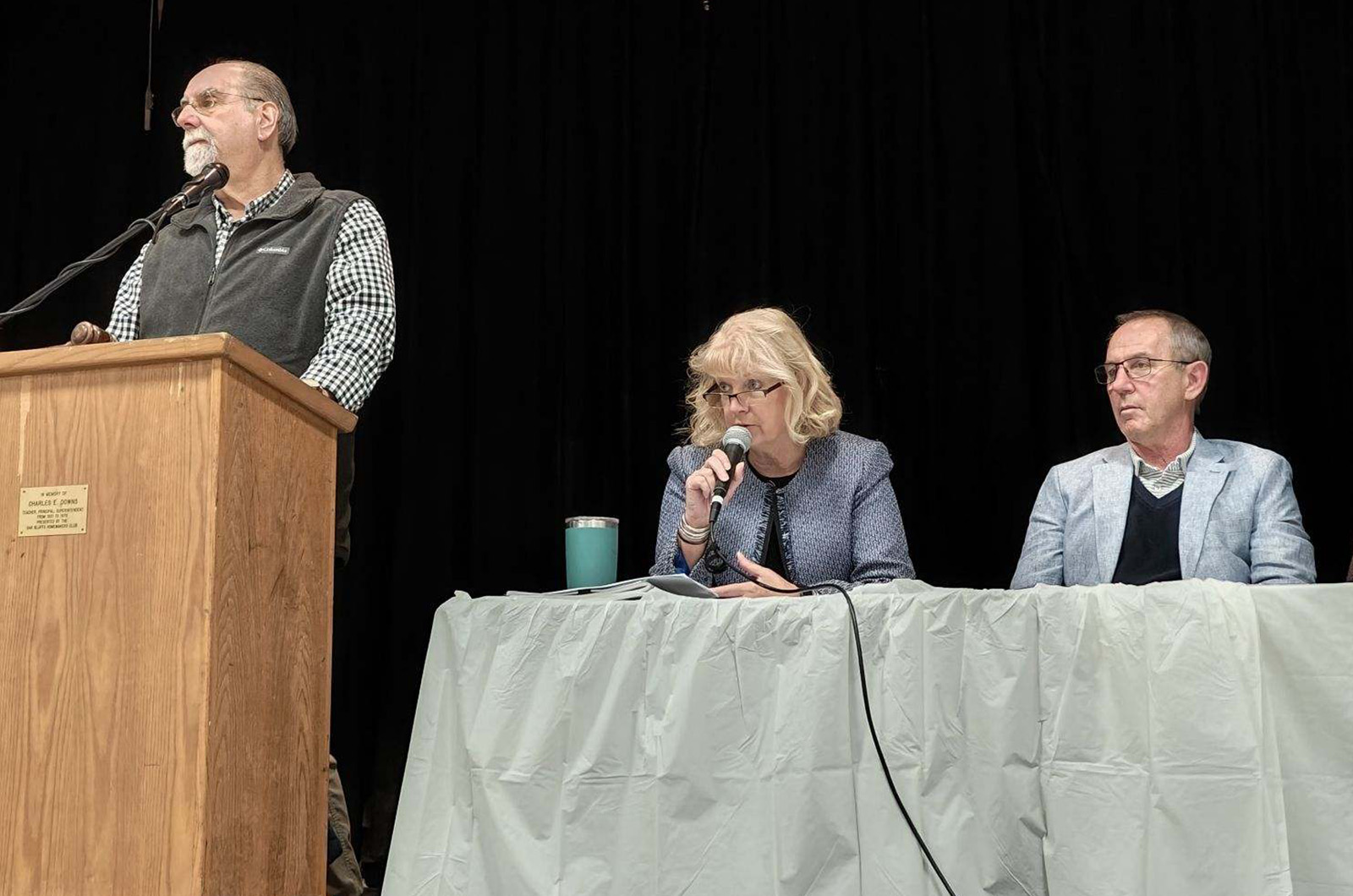Oak Bluffs residents voted to approve over $1 million dollars in spending at a special town meeting Tuesday, allowing the town to cover a stolen grant and move forward with a solar farm over the capped landfill.
Residents voted to transfer $332,000 from the general stabilization fund to cover stolen money meant to go towards wastewater improvements for the Southern Tier affordable housing project. The money, which was part of a state grant, was intercepted when it was sent from the town to the project developers, Affirmative Investments and Island Housing Trust. According to town administrator Deborah Potter and the executive summary included on the warrant, someone impersonated the Affirmative Investment representatives and got the town to redirect a payment to an incorrect bank account.
“Yes, this is a wire transfer that was a mistake, and yes, it’s an expensive one,” Ms. Potter said at town meeting. “We need to fulfill our role by completing the payment to the vendor in accordance with the terms of this grant, and as the party that was in the best position to avoid the fraud, we unfortunately are bearing the liability for this misstep.”
She went on to highlight that other towns in Massachusetts have been victims of similar crimes and to emphasize the money the town has saved through combining positions and working with a smaller number of employees. Ms. Potter also said that the general stabilization fund will still be at about $3 million dollars after the money is used to cover the lost grant money, which is about 7.8 per cent of the fund’s annual budget. She added that the involved vendor has offered a $75,000 discount on a future invoice or expense. Recovery efforts for the lost money are still underway.
“The FBI has said approximately $80,000 has been recovered. It was in some sort of Bitcoin,” Ms. Potter said.
Some of the money also ended up in Nigeria.
“I asked them if they would give me the Bitcoin back so I could hold on to it, but they declined,” Ms. Potter said.
The FBI did not provide a specific date as to when she will be able to apply for the recovered funds, she said.
Voters had questions about the incident.
Resident Mary Beth Naron wanted to know how the money was sent to the wrong account.
“What kind of protocols do you have in place? What was in place, or not in place, when that person was able to make that decision? That seems like a big money transfer, to have a mistake like that made without a check and balance,” Ms. Naron said.
Her question was echoed by Sherry Countryman, another voter, who asked if there had been a policy change as a result of this event.
Ms. Potter said there were informal policies in place, including receiving both written and verbal authorization, but that a new written policy will be put in place.
“I’m pretty confident the next time anybody comes through with either a new wire or a change in the wire, that’s going to go straight to the shredder,” she said.
Fred Hancock, an Oak Bluffs resident, spoke in favor of the spending article because of the project involved and that he believed the town will be more vigilant in the future.
“I don’t think we should lose sight of the fact that this is a very, very important affordable housing project,” he said. “If we don’t approve this money, it’s going to short circuit everything that’s been in place to get this money, to get this housing. While it’s important to make sure that people are held accountable, I think we shouldn’t lose sight of the overall project.”
Oak Bluffs residents also approved $750,000 to go toward a solar farm above the town’s capped landfill. The town plans to lease the land to a company that will build and maintain the solar array.
According to Ms. Potter, the lease will generate at least $80,000 per year for the town. The $750,000 will be used to maintain the project’s place in Eversource’s project queue. Without that money, the project would have to be reapproved, which could take years.
Marie Doubleday, an Oak Bluffs resident, wanted to know where the energy would go once the solar farm was connected to the grid. Dion Alley, a member of the town’s select board, explained that while the energy goes from the solar farm to the grid, as opposed to directly to a building or home, much of the energy would likely be used by town residents.
“Power, like water, will flow to the closest consumer that it has.” Mr. Alley said. “Right now, the land is just sitting there and not generating any revenue…It will be a revenue source over time to this town for the next 20 to 25 years.”
Richard Toole, an Oak Bluffs resident and a former Cape Light Compact representative, spoke in favor of the spending.
“Now is the time to do it,” he said. “It’s green energy, whether it saves us money or not, it’s green energy.”
Oak Bluffs voters also approved a $5,000 transfer from the sale of cemetery lots to be used for Oak Grove Cemetery’s general upkeep and a $4,000 transfer meant for water line improvements to be used for finishing the cemetery expansion. Four articles that updated and clarified the language of town bylaws dealing with the Council on Aging, the responsibility of municipal building upkeep and the purchase of fuel for the town were also approved.







Comments
Comment policy »